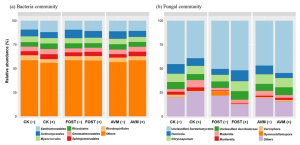A group from School of Bioengineering, Qilu University of Technology (Shandong Academy of Sciences), Jinan, 250353, China, etc. has reported that Burkholderia vietnamiensis B418 is an effective biological nematicide for nematode management.
https://www.nature.com/articles/s41598-022-12472-2
Root-knot nematodes (RKN), Meloidogyne spp., are highly polyphagous sedentary parasites capable of infesting a wide range of crops especially in greenhouse vegetable cultivation. During infestation, RKN can incite obvious knots or galls on plant roots, destroy the normal structure of the roots, compete with the host for water and nutrition, and make the host susceptible to secondary pathogens. Globally RKN damage is estimated to cause an annual economic loss of over $100 billion, accounting for about 12.6% of total crop losses.
The effects of different treatments on the reduction rate of nematode density and control efficacy against RKN are as follows.
All treatments (Burkholderia vietnamiensis B418 inoculation, fosthiszate, and avermectin) reduced nematode density to some extent compared with the negative control.
The highest reduction rate and control efficacy was observed with B. vietnamiensis B418 inoculation alone by 74.84% and 71.15%, respectively.
The introduction of B418 enhanced the inhibitory effects of chemical nematicide fosthiazate (from 38.92% to 62.71%) and biological nematicide avermectin (from 59.24% to 67.87%), which were still lower than that of B418 inoculated alone, indicating there was slight incompatibility within the combinations of B418 with fosthiazate and avermectin.
The application of B418 increased bacterial 16S rRNA sequences from 9.1% to 34.6%, and fungal ITS-2 rRNA sequences from 7.1% to 30.3%, which both exhibited more variation than the disease control treatments (9.1%).
The beneficial effects of PGPR on plant growth involve either direct mechanism such as biofertilization (facilitation of nutrient uptake including nitrogen and phosphorus primarily) and phytostimulation (production of plant growth promoting hormones), or indirect mechanism as biocontrol agents that antagonize the deleterious effects of phytopathogens by producing inhibitory substances or by inducing plant systemic resistance. The reason why inoculation of B. vietnamiensis B418 was effective in inhibiting RKN. However, it was found that the increment of Mortierella with B418 application was in accordance with the control effect against RKN. These variations in fungal community indicated that B418 inoculation resulted in the inhibition of pathogen-related species and the enhancement of plant-beneficial ones.
 CK: control; FOST: fosthiazate; AVM: avermectin. (+ /−) stands for with and without B418 inoculation.
CK: control; FOST: fosthiazate; AVM: avermectin. (+ /−) stands for with and without B418 inoculation.